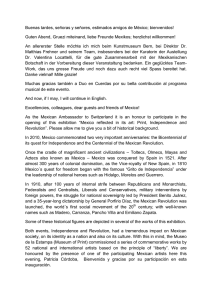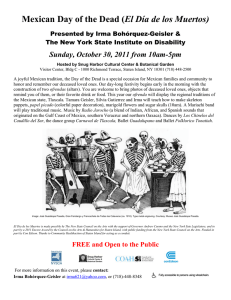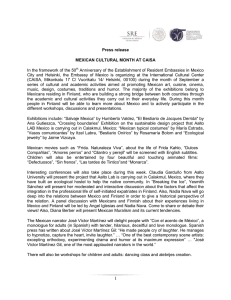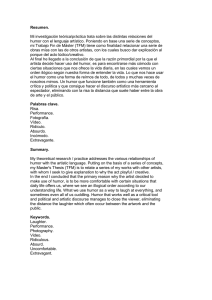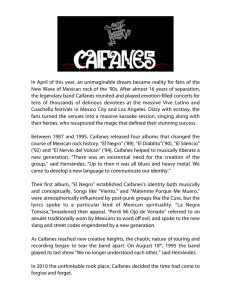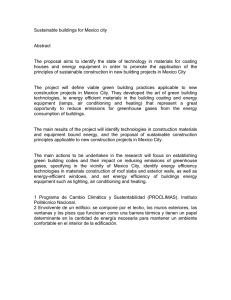13. Elitelore in Politics: Humor versus Mexico`s Presidents
Anuncio
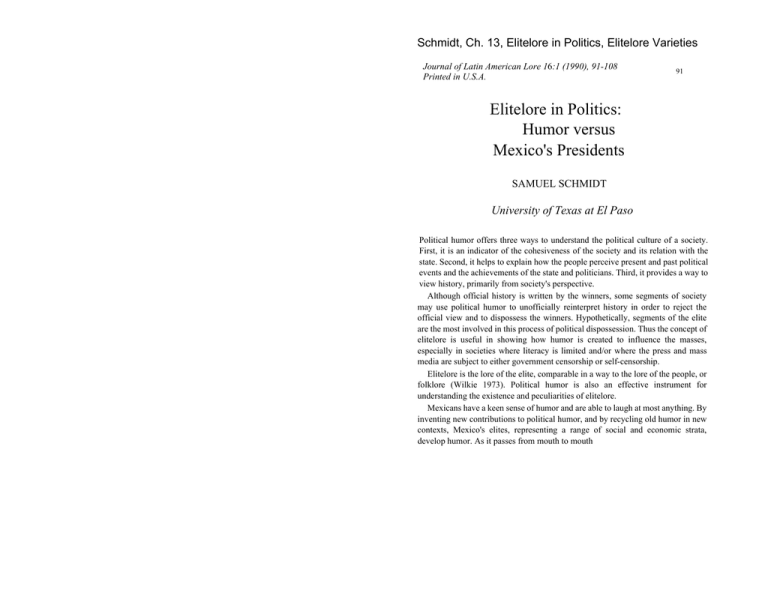
Schmidt, Ch. 13, Elitelore in Politics, Elitelore Varieties Journal of Latin American Lore 16:1 (1990), 91-108 Printed in U.S.A. 91 Elitelore in Politics: Humor versus Mexico's Presidents SAMUEL SCHMIDT University of Texas at El Paso Political humor offers three ways to understand the political culture of a society. First, it is an indicator of the cohesiveness of the society and its relation with the state. Second, it helps to explain how the people perceive present and past political events and the achievements of the state and politicians. Third, it provides a way to view history, primarily from society's perspective. Although official history is written by the winners, some segments of society may use political humor to unofficially reinterpret history in order to reject the official view and to dispossess the winners. Hypothetically, segments of the elite are the most involved in this process of political dispossession. Thus the concept of elitelore is useful in showing how humor is created to influence the masses, especially in societies where literacy is limited and/or where the press and mass media are subject to either government censorship or self-censorship. Elitelore is the lore of the elite, comparable in a way to the lore of the people, or folklore (Wilkie 1973). Political humor is also an effective instrument for understanding the existence and peculiarities of elitelore. Mexicans have a keen sense of humor and are able to laugh at most anything. By inventing new contributions to political humor, and by recycling old humor in new contexts, Mexico's elites, representing a range of social and economic strata, develop humor. As it passes from mouth to mouth 92 SAMUEL SCHMIDT or circulates in print, this humor, much of it about the Mexican presidency, soon is accepted by people from all walks of life and becomes part of the accepted “folklore” about Mexican presidents. Given the complexity or politics in Mexico, some political observers suspect that presidents have started jokes about themselves. Presidents know that jokes circulate and thus they try to influence the nature of the jokes, making them positive rather than negative. Presidents have also had unfair jokes created about themselves which are obviously off-target in order to produce a “rebound effect” intended to generate popular sympathy. Presidents often create jokes about themselves to divert harsh criticism in difficult moments. They realize the laughter can defuse popular hostility that could otherwise result in violence. As humor circulates it provide an alternative interpretation of history through which to analyze the relation between state and society. Humor conditions popular views of Mexico´s presidents and there is an important influence on politics. The scientific method makes the study of humor relevant and manageable, but ignores other kinds of information, as the following example illustrates. There blind people meet in front of an elephant and give their impressions. The first one says: “The elephant is a huge tree.” The second says: “The elephant is like a huge container.” The third says: “The elephant is like a huge snake.”1 As this Indian example shows, a subject can be recognized or analyzed from many different perspectives. All can be wrong even if they are accepted, but they can also be right if the explanation paradigm lacks enough information. In the Indian example, we are all blind because the explanation paradigm is insufficient. This notion is particularly relevant to the analysis of social and political humor and especially to the analysis of political humor. One form of political participation is the protest, but not everyone in society protests in the same form. The elite protest peacefully acknowledging their leverage in political relations, since they are aware of what is happening. Elites who have more accurate information about real social and economic situations recognize the weaknesses of politicians. Thus elites attack all these points with humor and try to influence politics. Because of its anonymity political humor is an effective instrument for criticizing politics. II constitutes no danger to those who use it, nor does it threaten the political system. Political humor can take many forms: 1 I am grateful to Jorge Gil for this excellent example, which he says is of Indian origin. Schmidt,INCh. 13, Elitelore ELITELORE POLITICS in Politics, Elitelore Varieties 93 caricatures, jokes, nicknames, poems, religious expressions, and linguistic devices such as anagrams and epigrams. Societies choose the most culturally appropriate form. Regardless of the particular medium, to produce the desired comic event, the joke must be short and contain enough information to be understandable (Freud 1973). The Causes of Mexican Political Humor The target of Mexican political humor is power, and the subject of attack is the individual or institution where the greatest share of power is centralized. Since Mexico is federal by law but centralized in fact, the president exercises the most power. As the symbol of power, the president is the subject of a great deal of Mexican political humor. The centralization of power, a basic characteristic of the Mexican political system, is reflected in the political culture by the fact that Mexicans reject all forms of power and authority. Historically, Mexicans suffered as a result of the Spanish conquest, lost half their territory to the United States, and have been governed by one party since 1929, all this against a backdrop of excess of power,2 corruption,3 and lack of real democracy. The average Mexican, regardless of socioeconomic status, faces in daily life a system of inequalities and power imbalance, where the individual, when confronted with political powers, sees no chance to win even if he is right. Neither the common nor the influential citizen feels he can influence the political system (Almond and Verba 1963).4 The average Mexican is ignorant of the political process-an underground process-but he suffers from its effects. Elites fight this ignorance using political humor. Through humor elites tell the truth, uncover the mystery of the hidden political process, and thereby destroy the pomposity of politics. Humor is able to strip the politician and show him as society wants to see him, not as he wants to be seen. 2 Most police jokes are about arbitrariness and the excess of power. Although corruption is common, its extent is unknown. One government prosecutor admitted that during the first two years of the Miguel De la Madrid administration (1983 and 1984), the government recovered $400 million dollars, but this represented only one percent of the stolen money in the same period (Ayala 1984). In his September 1, 1988, address to the nation, De la Madrid stated that during his presidency the government recovered $8,370 million dollars, after investigating 1,571 complaints against public servants (Excelsior, September 8, 1988, p. 4). 4 In 1986 I conducted a Delphi exercise in Mexico to measure the degree of acceptance of the moral reform of the government. I included questions similar to those of Almond and Verba and obtained worse results. My sample included only members of the political elite, and even they lacked the perception of being able to influence and receive equal treatment from judicial authorities. 3 Schmidt, Ch. 13, Elitelore in Politics, Elitelore Varieties 94 SAMUEL SCHMIDT Forms of Mexican Political Humor. During the late nineteenth and early twentieth centuries, humor was an important instrument of political competition (Rius 1984; Zano 1961; Pruneda 1958). The most common forms of political humor since the nineteenth century have been caricatures, which appeared in daily and humor magazines. Thus only the urban, most educated people, those who know how to read and have access to information, create and utilize humor. 5 Political groups and/or personalities used caricatures to attack their enemies and promote themselves. Caricature was the most important instrument for the political opposition in the years preceding the 1910 revolution, and has remained the most common instrument of political humor. In contrast to other forms of humor, caricature establishes a client/customer relation between the author and the reader involving some kind of ideological identification. In other forms, such as jokes, a relation can be established for the transmission, but it terminates at the end of the joke. In Mexico jokes are not confined to the political arena. The Mexican is known for the way he laughs and makes jokes about most anything, but in relation to politics he uses jokes to criticize the sacrosanct figure of the president and to synthesize his opinions about politics and about the government without fear of repression. Since most Mexicans do not participate formally in institutions such as political parties, they do so informally by telling jokes. Throughout the years of political modernization, especially since 1970 when a wide political opening began in Mexico, the voter abstention rate increased steadily from 57.6 percent in 1970 to 80.6 percent in 1979 (Schmidt 1988; SALA 1988); it decreased to 63.3 percent in 1988 but never reached the 1970 level (El Cotidiano, 1988).6 As electoral participation decreased, the number and intensity of jokes increased. The average Mexican accepts no responsibility for anything. He blames everyone but himself; and he blames the government for all the evils in society, economics, and politics. Society has chosen humor as a means for settling its accounts with the government. 5 Although Mexico's illiteracy rate is declining, humor appearing in print media reaches only the educated segment of society. Illiteracy rates since 1910 are the following: 1910 (76.9%), 1921 (71.2%), 1930 (66.6%), 1940 (58.0%), 1950 (42.5%), 1960 (37.8%), 1970 (16.4%), 1980 (16.0%), 1985 (9.7%). Data for the period 1910-1960 are from Wilkie (1978); for the period 1970-1985 from SALA (1988). 6 In my calculation, the total electoral abstention rare is the sum of the number who did not register, the number who did not vole, and the number of null voles. For analysis of electoral abstention see Schmidt (1988). For the 1988 data the government deleted from the reports the null votes; adding the null votes the actual abstention rare may be higher than 63.3%. ELITELORE IN POLITICS 95 Humor and the Mexican Presidents Jokes are indicators of society's reaction to something it finds upsetting. The Spanish conquest of Mexico was a real trauma. In this context a woman, La Malinche, became the lover and interpreter of Hernan Cortes, the conqueror. She betrayed her own people by aiding the conquerors, which helps to explain the present behavior of the Mexican male toward women.7 This act of treason together with a list of defeated and betrayed heroes, main features of Mexican history, are recorded in jokes. The jokes told about Mexican rulers include those about Cuauhtemoc, the Aztec emperor who faced Cortes. Although Cuauhtemoc was not Mexican in terms of the modern concept of a nation state, he and the Aztecs are viewed in Mexican history as the forebears of the nation. The jokes below show the impact of these historical events on the Mexican culture of today. The Spaniards burned Cuauhtemoc's feet to force him to disclose where the Aztecs hid their treasure: The Spanish torturer who was burning Cuauhtemoc's feet became very impatient, so he told Cuauhtemoc that if he didn't disclose the whereabouts of the treasure he would torture his family. Cuauhtemoc agreed and began to give the interpreter detailed instructions on how to locate the treasure, which entrance to the pyramid to use, which passage to follow, and so on. The interpreter memorized all the details and then said to the Spaniard: "The emperor Cuauhtemoc says he doesn't care about his family." I have not collected any jokes of the colonial period nor for the first sixty years after Mexico's independence, although graffiti and poems were common.8 One anonymous poem written on a wall in Mexico City at the end of the conquest period reads as follows: Cortes, quemaste los pies a Guatemoc por el oro y aqueste es el dia que añoro que a este subdito le des una brizna del tesoro aunque lo escondas despues. 7 8 Cortes, you burned Cuauhtemoc's feet for the gold. This is the day I long for when you give this subject a wisp of the treasure even if you hide it afterward. This is Octavio Paz's explanation (Paz 1986). I have collected jokes from history books (Gallo (987), journal articles on humor (Beezley 1985), and through many years of hearing them told in numerous different social environments. It is difficult to determine the best method for collecting jokes. I have known some jokes for more than twenty years. My professional interest in political humor began in 1980 when I concluded that it plays all important role in political behavior (Schmidt 1986). 96 SAMUEL SCHMIDT The quest for respect, wealth, and honor characterized the actions of the Spanish rulers in the colonial era. An epigram written to the viceroy describes I this situation: nos dejo el Virrey Marquina una fuente en que se orina y alii se acaba su historia. ELITELORE IN POLITICS Schmidt, Ch. 13, Elitelore in Politics, Elitelore Varieties97 investment and the Mexican people feared they would again lose part of their Country to foreigners. President Porfirio Diaz was strongly attacked through caricatures and jokes: When a head of state came to heaven, God stood up to welcome him, but when Porfirio Diaz came, God remained seated. Saint Peter told him: "Holy Father, this is the President of the Mexican Republic. Why didn't you stand up?" God answered: "Because if I stand he will sit on my throne."10 For perpetual memory viceroy Marquina left us a fountain for urinating in and there his history ends. Mexican history is a collection of traumatic events. In this essay I do not review all of Mexican history but mention some of the more traumatic experiences and the humor related to them, because all of them are associated with politicians and the country's leaders. Following the war for independence which gave rise to the Mexican nation, the next traumatic event was the loss of half of Mexico's territory to the United States, as a result of the Mexican-U.S. war in 1848. Antonio Lopez de Santa Ana, an example of the excess of power as he proclaimed himself emperor, was blamed for the loss. When he lost a leg in a battle he ordered a state funeral for his leg. The following poem was written on the leg's tombo:ing poem was written on the leg's tomb: funeral for IS ego Es santa sin ser mujer es rey sin cetro real es hombre mas no cabal y Sultan al parecer. It is a saint without being a woman, it is a king without royal scepter, it is a man but not a complete man, apparently a Sultan. Parte en el sepulcro esta y parte dandonos guerra. ¿Si sera esto de la tierra o que demonios sera? Part is in the grave and part is bothering us. Is this of the earth or what the hell is this? A contemporary joke about this episode in Mexican history shows what the people think of it: According to nonofficial history, in the middle of the battle between the Mexicans and Americans, both armies were tired and decided to surrender, so each sent an emissary to surrender to the enemy. The emissaries met in the middle of the road. The American looked at the Mexican and asked him: "Hey Mexican, where are you going?" The Mexican answered: "I'm going to present the surrender of our army." "Well, then, come with me," said the American. You see, if the Mexican had been smart and had asked first, history would be different. Now there is no use insulting him.9 Diaz was also given nicknames, such as "El Lloron de Icamole" ("The Cry-baby of Icamole"). It is said that he cried after losing the battle at Icamole. The nickname represented revenge on the part of the people because a political and military leader should not cry. Thus after humor was used on him, Diaz fell from his semigod altar to become just another mortal. The Mexican Revolution, like any civil war, is full of stories of heroism and treason, but in the case of Mexico it is a continuation of the Mexican trauma. The following graffiti example relates to General Victoriano Huerta, who was blamed for the killing in 1913 of President Francisco I. Madero, the leader at the Outset of the Revolution: Quizo alcanzar la victoria el traidor de Victoriano. ¡Como si victoria y ano fuesen igual en la historia! Victoriano the traitor wanted to gain the victory, as though victory and anus were the same in history! Like many jokes about presidents, those attacking Madero were intended to degrade him: When Madero died he came to heaven and asked to see Jesus. Saint Peter came to see Jesus and got his answer: "Yes, of course, let him in," said Jesus. "Madero, just as I, offered a lot and never accomplished any of it."11 When President Venustiano Carranza (1917-1920) was betrayed and killed in Tlaxcaltenango the following poem was written: Si vas a Tlaxcaltenango procura ponerte chango porque allí a Barbastenango Ie sacaron el mondongo. If you go to Tlaxcaltenango try to be very careful because over there Barbastenango was smashed.12 The period of political stability after the Revolution gave rise to a series of nicknames and jokes including many references to corruption. The latter part of the nineteenth century was characterized by dictatorship and repression of the opposition. The government allowed foreign 10 9 It is difficult to gather jokes from earlier historical periods. Because they exist only in oral form they disappear quickly. I suspect that many jokes about early history, like this one, are or recent invention and are used to reinterpret history. 11 12 A different version of this joke was told about Spain's Francisco Franco. References to God are a recurring feature. Carranza was nicknamed Barbastenango because of his beard (barba). Schmidt, Ch. 13, Elitelore in Politics, Elitelore Varieties SAMUEL SCHMIDT 98 99 ELITELORE IN POLITICS 15 Alvaro Obregon, president of Mexico from 1921 to 1924, had a reputation for being corrupt. He coined the phrase "Nobody can stand a $50,000.00 gunshot," a reference to the price he was paying to politicians. His nickname was "EI quince uñas" ("fifteen nails") because he lost an arm in battle (in Mexican slang meter uña [nail]) means to steal). The following joke focuses on the corruption issue: A representative of the automobile industry came to give Obregon a car as a present. Obregon answered that he could not accept the gift, but would be glad to pay for the car. The representative of the industry had orders 10 give the present so he said to Obregon: "Well, Mr. President, give me one peso." Obregon said: 13 "So cheap? Here take two pesos and send me two cars." There were also poems about Obregon: Cuando Obregon se entero que el diablo no lo queria muy serio reflexiono de que medios se valdria. Obregon, inteligente siempre, tuvo sus chispazos. Le vinieron a la mente sus famosos cañonazos. Conferencio con Luzbel para hacerle convenir estar en todo con el mediante los cincuenta mil. When Obregon found out that the devil didn't like him he thought very seriously about what to do. Obregon, being smart, always had his moments of brilliance. He remembered his famous gunshots. He talked to the devil and convinced him to support him in everything to the tune of fifty thousand. Plutarco Elias Calles, elected president in 1925, became very powerful. His term ended in 1928 but his influence continued until 1936 when President Lazaro Cardenas 14 deported him. Calles was the "lider maximo" and the years between 1929 and 1934 were known as "the maximato." Calles was known as "EI turco" ("The Turk") because of his Arab (Lebanese) origin. Although there is an attribution of corruption in the winy phrases about Calles, the jokes concentrated on his power:: When he built his home in front of Chapultepec castle, which was then the presidential residence, the people in the castle used to say: "Here lives the president, but the ruler lives across the street." 13 Lukes and Galnoor (1985) found a similar joke ill the Soviet Union. They also list a few presidents jokes with the recurring image or God, Although it is beyond the scope of this ankle, it is important to trace the origins of jokes. See, for example, Banc and Dundes (1986, 1990). 14 The highest ranking leader. From 1929 to 1934 Mexico had three presidents nicknamed "Pelele I, Pelele II, and Pelele III" ("Dummy I, II, and III"). ' One of the mysteries of Mexican politics is how the presidential candidate of the Partido 16 Revolucionario lnstitucional (PRI) is appointed. A joke solves the puzzle: Calles and Lazaro Cardenas got together, and Calles told Cardenas: "We have considered you for the presidency, because of your undoubted revolutionary good stock." With an imperturbable expression, Cardenas asked him: "You will excuse my ignorance, general, but what is good stock?" Calles, surprised by his question, told him: "Good stock is ... Who the hell knows! The important thing is that you 17 will be the next president of Mexico. Lazaro Cardenas, "el trompudo" (referring to his large mouth), took office in 1934 and was 18 a leading figure in the continuation of the Mexican Revolution. He accelerated agrarian reform, expropriated the railroads and the oil companies, and seemed to be the most popular president. Jokes about Cardenas both praise him and criticize him: What do Cardenas and a brassiere have in common? Both oppress the uprisings and hold the fallen. Cardenas received the Nobel Prize in mathematics because he divides land, 19 multiplies difficulties, and subtracts in the capital city. 15 The three were Emilio Portes Gil (1929-1930), Pascual Ortiz Rubio (1930-1932), and Abelardo Rodriguez (1933-1934). When Lazaro Cardenas took office, the presidential term was extended to six years beginning on December 1. Thus Rodriguez and Cardenas served in 1934. 16 The PRI has been ruling party in Mexico since 1928 when it was formed as the Partido Nacional Revolucionario (PNR). The party changed its name-in 1938 to Partido de la Revolucion Mexicana (PRM) and in 1946 to its present name, Partido Revolucionario Institucional (PRI). The party's internal structure also underwent change. The military was included as a sector in 1938 and was eliminated in 1946. Presently, the PRI consists of three sectors-workers, peasants, and the popular sector. The tatter comprises a wide range of organizations, from merchants to professional organizations. Between 1929 and 1988 the PRI never lost a presidential or gubernatorial election. 17 In Spanish "buena capa" ("good stock "). Jokes are difficult to translate. Frequently a pun or play on words, and thus the comic effect, is lost in translation, As an aid to the reader, however, an attempt has been made to provide meaningful translations. 18 For a detailed account of the Mexican Revolution and the governments that followed it, see Wilkie (1970). The Mexican edition (Mexico: Fondo de Cultura Economica, 1978) extends the period covered. 19 Refers to Cardenas's agrarian reform policy and the effect of subtracting political forces in the capital city, the main core of the Mexican political system. The Nobel Prize issue reappears more than thirty years later with Echeverria, who received the Nobel Prize in chemistry because he made shit out of the peso and later in reference to President Jose Lopez Portillo, 100 SAMUEL SCHMIDT Manuel Avila Camacho was president of Mexico from 1941 to 1946. His administration was fairly stable, and the economy, which supported the American war effort, began to grow steadily. His nickname was "el buche" ("the maw") and when he was named the presidential candidate his nickname became "el soldado desconocido" ("the unknown soldier") in reference to his poor military record as a general (Gallo 1987). Although I have not found jokes about Avila Camacho, one attacking his brother, the Secretary of Communications, tells of the people's complaints about presidential family excesses:: When Maximino Avila Camacho was named Secretary in the President's cabinet, he appointed an honest person in a position where large amounts of money were involved. After a few months this person bought a house and invited his boss to thank him for the opportunity. After much insistence Avila Camacho accepted the invitation and came to the house, a huge mansion full of paintings and other art objects. Then he asked his collaborator: "Was this house expensive'?" "Oh no, sir. The owner was having financial difficulties and sold it to me for $200,000.00." "And all the remodeling and art objects?" "I also took advantage of sale opportunities and got everything for another $100,000.00, so in the end everything cost me $300,000.00." Then Avila Camacho told him: "You know, you are lucky. You just made $100,000.00. I am going to buy this house from you for $400,000.00. Bring all the papers to my office tomorrow." Miguel Aleman succeeded Avila Camacho and was president from 1946 to 1952. The economy continued to grow during a period that became known as the "Mexican miracle." Elected at the age of forty-three, Aleman was the first civilian elected president and was seen as a sign of a maturing revolutionary process. Soon, however, corruption began to develop. Aleman was accused of buying land in Acapulco and later initiating government efforts to develop the port city because it was in his personal interest to do so. The jokes about him focus on the theme of corruption like the following one using the analogy of a play: This is a play. First act: A past ruler, with his family. who received three Nobel prizes- the physics prize because he made the peso float and then it sank; the chemistry prize because he made shit out of the peso; and the biology prize because he convened a man into a dog. Under Lopez Portillo's economic policy, the peso first began to float; then the president stated that he would defend the peso like a dog; and later he devalued the peso. Banc and Dundes (1986) quote a similar joke about Marshal Tito of Yugoslavia, who was nominal red for the Nobel Prize in chemistry because he converted the dinar into shit. Note the occurrence of the Mexican presidents and Tito jokes in two very different cultures, Lukes and Galnoor (1985) quote a joke in which a mathematics professor , complaining to his students that everything gets mixed up when politics are involved, said: "Have you noticed that problems multiply by the divisions?" ELITELORE POLITICS Schmidt,INCh. 13, Elitelore in Politics, Elitelore Varieties 101 Second act: The same with his friends. Third act: Again the same ruler with his collaborators. What's the name of the play'? Ali Baba and the forty thieves. In contrast to Aleman, Adolfo Ruiz Cortines (1953-1958) was an old president. After the devaluation of the peso during the Aleman administration the rate of inflation declined and the economy continued to grow during his term. There were signals, however, such as the railroad strike, in 1956 and the teachers' conflict in 1958, that political stability was beginning to erode. Nevertheless, political humor still related to the president's age. Ruiz's nickname was ARC (his initials) meaning Antigua Reliquia Colonial (Antique Colonial Relic): When Ruiz Cortines was campaigning in Guadalajara, one evening he was walking with his aides and asked one of them: "Well, what's new? What do the people say?" The aide answered: "You know, always the same, that you are too old, you just can't perform." At this point Ruiz Cortines said: "Well do these guys want me for a president or for a stud?" Adolfo Lopez Mateos, president from 1959 to 1964, faced numerous labor strikes. Most were aimed at establishing collective contracts, and were solved through arbitration.20 Lopez Mateos began to promote Mexico internationally and for that purpose he traveled abroad extensively. Thus he became known as "Lopez paseos" ("Lopez tours"). Although he startled national and international public 'opinion when he declared that he would govern from the constitutional left, I have no evidence that this was reflected in humor. When Lopez Mateos left office this epigram was written: Se acabaron los paseos ¡Oh paladin de la paz! Ya te vas López Mateos Lopez Mateos ye te vas Y te vas haciendo feos pues hiciste a Diaz Ordaz. The tours are finished Oh peace paladin! You are leaving, Lopez Mateos Lopez Mateos you are leaving and you go not looking very happy since you made Diaz Ordaz.. Gustavo Diaz Ordaz (1965-1970) was the last president to serve during Mexico's period of economic stability. Although at the beginning of his term he faced a doctors' strike and in 1968 a major student uprising, currency was stable, inflation low (around 3.5 percent a year), and economic growth continued. However, there were voices in Mexico saying that a structural crisis was under way which required attention (see Martinez Rios 1970). Despite the popular conflicts reflected in humor, the elite seemed 20 For an account of the strikes during the period 1936-1976, see Schmidt (1986), specifically Appendix 1. Schmidt, Ch. 13, Elitelore in Politics, Elitelore Varieties SAMUEL SCHMIDT 102 ELITELORE IN POLITICS to worry more about the president's appearance. Not blessed with good looks, Diaz was nicknamed "el chango" ("the monkey"), "el feo" ("the ugly"), "el pozole" (a soup made of pig's ear and mouth): Te has de quedar sin perro que te ladre con todo el corazon yo te lo digo adios pinche pelon, ¡chinga tu madre! El pueblo k Once Diaz Ordaz was on a visit to the state of Veracruz where the weal her can be windy and rainy. He was sitting with Governor Lopez Arias. The weather was worsening and the governor told the president: "How ugly [feos] these days [dias] are." The president responded: "That's right, but the López are not any better." GOOD-BYE CAVARRÍAS (Sonnet) You did what you promised, you son of a bitch, demagogue, fanatic, impersonator. You screwed us up, nobody denies that. 21 Chaos was always upward and forward. And you are leaving very happy. What a bastard! 22 And stupid Esther, so satisfied with her shitty work which was a mess. You almost destroyed the country. 23 You and your comrade robbed us. All the world will be witness to that, 24 here, in Cancun, and everywhere. You will be alone with not even a dog to bark at you. I am telling you this with all my heart. Good-bye you bald asshole. !Screw you! The people During the 1968 student uprising there were slogans and taunts about the government (Beezley 1985) but no jokes. One touches slightly on the issue, but its aim is really to attack the next president, Luis Echeverria: One day Diaz Ordaz was meditating and reached the conclusion that the people of Mexico were unfair with him. They laughed about his ugliness and blamed him unjustly for the 1968 conflict. In revenge, he appointed Luis Echeverria his successor. Disruptive forces plagued the Mexican economy and politics during the presidential term of Luis Echeverria (1970-1976). An economic recession began during this period, and there were conflicts in almost all sectors of society including education, transportation, and electricity as well as urban and rural guerrilla activity. Political humor was caustic and attacked the president as the one responsible for the situation. Echeverria did not have a nickname but the jokes depict him as stupid. A Mexican gets to heaven and is shown a set of clocks showing the stupid actions of (he presidents. He looks at those for Aleman, Lopez Mateos, Ruiz Cortines, and other presidents and they all move at a reasonable speed. Suddenly he asks for the Echeverria clock and the answer is: "It's in the game room being used as a fan." The poems were equally harsh: ADIOS CHIVARRÍAS (Soneto) Tu palabra cumplida, hijo de puta, demagogo, fanático y farsante que nos jodiste, no hay quien lo discuta EI caos fue siempre, arriba y adelante Y te vas muy feliz ¡Que poca madre! Y la pendeja Esther muy satisfecha con su pinche labor que fue un desmadre dejan a la nación casi deshecha Que nos robaron tu la compañera todo el mundo será testigo aquí, alla en Cancún y dondequiera.. 103 My collection of jokes from this period on is growing. Since jokes are an oral manifestation the effort to collect them relies on interviews with people involved in politics or with joke tellers. Collecting political jokes is a kind of oral social history. Now many people tell me jokes because they know that I am collecting them, but it is not easy to build a network of joke tellers. Jose Lopez Portillo was elected president (1976-1982) without opposition. His arrival was seen as a relief from the conflict-ridden Echeverria period. With the discovery of oil it was expected that Mexico's economic crisis would be solved. Well liked, Lopez Portillo was a charismatic leader, but soon the people discovered that he was a nepotist and corrupt. According to rumors, he had an affair with a woman who was promoted to Secretary of Tourism. Humor focused on corruption, his love affairs, and his inability to solve the economic crisis: 21 "Ariba y Adelante" ("Upward and Forward") was the slogan of Echeverria's presidential campaign. 22 Echeverria's wife. 23 Echeverria called his wife "La compañera" ("the comrade") using the leftist language of equality between man and woman. ' 24 To this day, like Aleman during the 1940s with respect to Acapulco, people think that Echeverria built Cancun as his personal business. 104 SAMUEL SCHMIDT Once when Lopez Portillo went to Monterrey to inaugurate an equestrian monument the people said that it was the statue of the animals.25 Very caustic poems were also composed about Lopez Portillo, as seen in t he following excerpt s from a very long one called “Disillusion”: En el sexenio pasado Un loco nos gobernó dejandonos bien fregados y a todos nos rechingó. In the last sexenio a crazy man ruled us. He left us messed up, and screwed all of us. Hoy otro loco en Los Pinos como perrito amistoso gobierna con desatino con su sistema mañoso. Today there is another crazy in Los Pinos.26 like a friendly dog he governs with foolishness, with his cunning system. Arruino la economia con planes descabellados dejandonos arruinados. Nos devaluo la moneda, encarecio la pitanza, por poco nos deja ... nos dejo vacia la panza. Del cubano gran amigo, se siente muy comunista. Le quiere dar en la madre al gringo capitalista. A dona Carmen Romano la pinta un "habil pincel". ¿Es modelo de Tamayo o madrota de burdel? Y la hermana Margarita con su cara de pambazo presume de muy bonita y es ridiculo payaso. Su hijo Jose Ramon con barbas como el cubano de los bancos usurero He ruined the economy with wild plans leaving us ruined. He devalued the currency, he made food more expensive, and left our stomachs empty. A great friend of the Cuban.27 he feels very communist. He wants to screw the capitalist gringo. A skillful brush paints doña Carmen Romano.28 Is she Tamayo's model or a brothel mistress? And his sister Margarita, with a face like white bread, prides herself in her beauty but looks like a ridiculous clown. His son Jose Ramón,29 with a beard like the Cuban, of the bank racketeer 25 Assuming that he was riding the horse, the people said that a dog was riding a horse. The presidential residence. 26 The presidential residence. 27 Fidel Castro. Lopez Portillo's wife. 28 Lopez Portillo's wife. During Lopez Portillo's term his son Jose Ramon was appointed undersecretary of programming and budgeting. 29 During Lopez Portillo's term his son Jose Ramon was appointed undersecretary of programming and budgeting. ELITELORE IN Ch. POLITICS Schmidt, 13, Elitelore comunista de salón rojillo guadalupano 105 in Politics, Elitelore Varieties living room communist red Guadalupan.30 When Miguel De la Madrid took office for the period 1982-1988 the Mexican people were already disillusioned. He was an obscure technocrat, and despite the wide democratic opening and extensive political reform, Mexicans abstained from voting. De la Madrid adopted a contractional economic policy. Inflation increased by more than 100 percent, unemployment grew, and real salaries fell. In 1985 the strongest earthquake in the nation's history struck Mexico City, and a devastating drought occurred in the same year. Since the president appeared incapable of handling the situation, political humor became more caustic: What do Tarzan and De la Madrid have in common? Both are surrounded by animals, but the animals listen to Tarzan. De la Madrid's decision to leave the presidency in the hands of another technocrat identified with economic failure generated a strong response. For the first time, the PRI faced possible electoral defeat,31 and Carlos Salinas de Gortari, the PRI presidential candidate and political personality most associated with the failure of the economic policy, met an immediate humorous response. The jokes that emerged show social revenge against De la Madrid and Salinas. The jokes about Salinas focus on his personal characteristics; he is short, bald, and has big ears (Reding 1988): Los Pinos will change its name to Disneyland, because Mickey Mouse is leaving, and Dumbo has arrived. At least one poem was written about Salinas when he was overexposed to public opinion as secretary of programming and budgeting. Here are excerpts: ¿DE QUE SE RIE? WHAT ARE YOU LAUGHING ABOUT? En una exacta foto del diario señor ministro del imposible. In an exact picture from the newspaper Mr. Minister of the Impossible. Tienen sus hijos ojos de mando pero otros tienen mirada triste.. Your sons have eyes of authority but others look sad. 30 Guadalupan refers to the virgin Guadalupe, Mexico's patron saint, showing the obvious contradiction between communism and devotion to the virgin. 31 The opposition claims to have been defeated by an electoral fraud. Schmidt, Ch. 13, Elitelore in Politics, Elitelore Varieties ELITELORE IN POLITICS 106 Ustedes duros con nuestra gente porque con otros son tan serviles. You are tough with our people. Why with others are you so servile? Como traiciona al patrimonio mientras el gringo nos cobra el triple. How you betray the patrimony while the gringo charges us triple. Aqui en la calle sus guardias matan y los que mueren son gente humilde. Here in the street your guards kill and those who die are humble people. Despues de todo usted es el palo mayor de un barco que se va a pique After all, you are the major mast of a sinking ship. Conclusions My analysis of jokes, the most common form of political humor in Mexico, shows that they are aimed primarily at the President. Political humor in Mexico seems to exhibit a cyclical pattern. Society usually grants the new president a one-year grace period to demonstrate his abilities. During that year the jokes relate to the former president and perhaps to the new president's appearance but, in general, they tend to be benevolent. As the sexenio32 continues, the jokes begin to concentrate on the president's mistakes or failures. Most twentieth-century Mexican presidential jokes refer to the corruption issue. Humor also attacks historical events, heroes, and national symbols, such as the flag and the anthem, to show Mexican society's displeasure with the way the country is being managed. The findings suggest that the elite create and communicate the jokes. The elite, the educated segment of society, have the strongest historical memory. Because they maintain social relations with political personalities and know the gossip of the political court, they are able to translate this knowledge into jokes and to make fun of politics and the politicians. Through humor, they can exert pressure on the politicians and influence politics. Remember that President Echeverria blamed the Monterrey group in 1976 for conducting a campaign of jokes and rumors aimed at destabilizing the government and one of the members of the business elite acknowledged that they conducted such a campaign (Schmidt 1986). 32 107 SAMUEL SCHMIDT The six-year period of the Mexican presidency. Throughout modern Mexican history the elite have been the only segment of society able to influence the government from beyond the limits of politics. The other segments, social classes, and political organizations do this in the formal political scenario. Thus political humor seems to be a part of the Elitelore. References Almond, Gabriel, and Sydney Verba 1963 The Civic Culture: Political Attitudes and Democracy in Five Nations. Princeton: Princeton University Press. Ayala, Armando 1984 JLP: Secretos de un sexenio. México: Grijalbo. Banc, C., and Alan Dundes 1986 First Prize: Fifteen Years! London: Associate University Press. 1990 You Call This Living. Athens and London: University of Georgia Press. Beezley, William H. 1985 "Recent Mexican Political Humor." Journal of Latin American Lore 11(2): 195-224. El Cotidiano 1988 Mexico: Universidad Autonoma Metropolitana. Freud, Sigmund 1973 El chiste y su relación con lo inconsciente. Madrid: Alianza Editorial. Gallo, Miguel Ángel 1987 La sátira política mexicana. México: Quinto Sol. Lukes, Steven, and I. Galnoor 1985 No Laughing Matter: A Collection of Political Jokes. London: Routledge & Kegan Paul. Martinez Rios, Jorge 1970 El perfil de México en 1980. México; Siglo XXI. Paz, Octavio 1986 El laberinto de la soledad. México: Fondo de Cultura Económica. Pruneda, Salvador 1958 La caricatura como arma política. México: Instituto Nacional de Estudios Históricos de la Revolución Mexicana. Reding, Andrew 1988 "Favorite Son." Mother Jones (November). Rius 1984 Un siglo de caricatura en México. Mexico: Grijalbo. SALA (Statistical Abstract of Latin America) 1988 Vol. 26. Edited by James W. Wilkie, David E. Lorey, and Enrique Ochoa. Los Ángeles: UCLA Latín American Center Publications. Schmidt, Samuel 1986 El deterioro del presidencialismo mexicano. México: EDAMEX. 1988 "Votación en la frontera México-Estados Unidos, 1961-191l2." In S. Schmidt, J. Wilkie, and M. Esparza, eds., Estudios cuantitativos sobre la historia de México. México: Universidad Nacional Autónoma de México. 108 SAMUEL SCHMIDT Wilkie. James W. 1970 The Mexican Revolution: Federal Expenditure and Social Change since 1910. Berkeley: University of California Press. 1973 Elitelore. Los Angeles: UCLA Latin American Center Publications. 1978 La Revolución Mexicana (1910-1976): Gusto federal y Cambio Social. México Fondo de Cultura Económica. Zuno, Jose 1961 Historia de la caricatura en México. Guadalajara. Schmidt, Ch. 13, Elitelore in Politics, Elitelore Varieties
